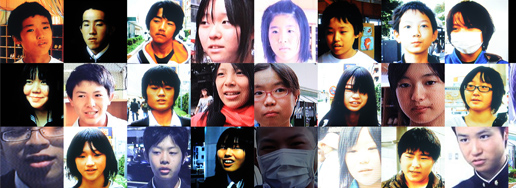F/T12 Jelinek Series: Kein Licht Ⅱ
Port B
Concept, Direction: Akira Takayama [Japan]

Performing Arts Festival launching from Tokyo
Port B has drawn widespread attention in Japan and abroad for its tour performances and installations referencing and constructing the present realities of cities, and the memories and landscapes of society. In its recent work it has explored the minorities latent in cities, and questioned the public and the private. For F/T10 its "The Complete Manual of Evacuation - Tokyo" set up a series of "evacuation" points within the urban space, and connected audiences to these realities through the internet. "Compartment City - Tokyo" was first created for F/T09 Autumn and then was invited to the Wiener Festwochen in May and June 2011. The acclaimed international collaboration project featured video interviews with 240 people recorded in a central Vienna park.
F/T11 saw the group then present "Referendum Project", which inquired into the diverse fractures that had become manifest in Japanese society following the 3.11 catastrophe, and asked whether it was possible to repair somehow through a theatrical vision. The project featured video interviews with 440 middle school students that visitors watched inside a truck installation that toured around Tokyo and Fukushima. The emotions and utterances of the children, still shaken by the massive catastrophe that had only just happened, both served as a mirror reflecting present day Japan, as well as a document or archive to be decoded in the future.
For F/T12 Port B will take its departure point from playwright Elfriede Jelinekʼs sequel to "Kein Licht.", originally published on her website on March 12, 2012 as "Fukushima - Epilog" [sic]. This tour performance will fictionally reconstruct memories of Fukushima and present a new "staging" methodology for the Jelinek text. Austrian writer Jelinek won the 2004 Nobel Prize for Literature and is acclaimed across the world. She wrote an urgent response to the events of last yearʼs Great East Japan Earthquake and the subsequent Fukushima disaster in her play "Kein Licht." (No Light), which showed the influence of the chaotic deluge of information that continues to proliferate even now. After "Kein Licht." was written and staged, Jelinek published an epilogue on her website this March, quietly resisting the "closure" being imposed on the catastrophe. Within the text we can find the language of "Antigone", the tragedy of Sophocles that features a heroine who allies herself with the dead, and refuses to stop speaking even in the face of the vast power of the state.
"Kein Licht II" will draw on Jelinekʼs method of "translating" and rearranging the cascade of reportage and research that has been overflowing into the world since the disaster. Port B will take Jelinekʼs words and compose a fictional "Fukushima tour" that places Fukushima over the Tokyo cityscape. This will become a departure to a journey around the language of Jelinek and Antigone, superimposing over the familiar Tokyo scenery the imagery of Fukushima that made such an impression through media photographs. In the midst of these overlapping layers of Fukushima and Tokyo, the imagery of the two places will be defamiliarized and the distance between them thrown into tumult. Audiences will witness a new "Fukushima" in this work, the first ever tour-style performance of a Jelinek text, re-grasping the actuality in the relationship between the capital and the prefecture.